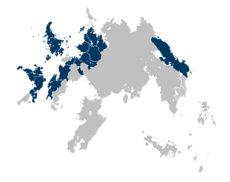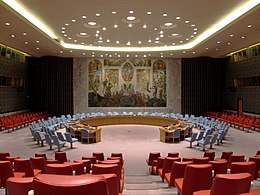Assembly of Nations
Assembly of Nations | |
|---|---|
 Map showing the members states of the Assembly of Nations | |
| Headquarters | Königsreh (international territory) |
| Official languages | |
| Type | Intergovernmental organization |
| Membership | 16 member states |
| Leaders | |
| X | |
| X | |
| X | |
| X | |
| Establishment | |
• AN X signed | X |
• Charter ratified | X |
• First Great Council meeting | X |
Website www.an.org www.an.int | |
The Assembly of Nations (AN or sometimes AoN or AON) is an intergovernmental organization established to provide and maintain international peace and security, developing close relations among member states, achieving widespread international co-operation, and being a forum for the diplomatic interaction between nations. It was founded after the Continental War during the Treaty of Sigairen, with its aim of preventing any future wars on the scale of the Continental War, and evolved as a organization dealing with maintaining international peace and security, protecting human rights, providing humanitarian aid, promoting sustainable development, and upholding international law. Its headquarters, with all AN territories as subjects to a status of extraterritoriality, are in Köpenick, Königsreh, and it has other main offices in X.
The AN is the largest, most familiar, most internationally represented and most powerful intergovernmental organization in the world. At its founding, the AN had X member states. As of 2019, there are now 20.
History
Structure
| UN General Assembly — Deliberative assembly of all UN member states — |
UN Secretariat — Administrative organ of the UN — |
International Court of Justice — Universal court for international law — | ||||
|
|
| ||||
| UN Security Council — For international security issues — |
UN Economic and Social Council — For global economic and social affairs — |
UN Trusteeship Council — For administering trust territories (currently inactive) — | ||||
|
|
| ||||
Membership
- ↑ "UN Charter: Chapter III". United Nations. Retrieved 2 November 2017.







